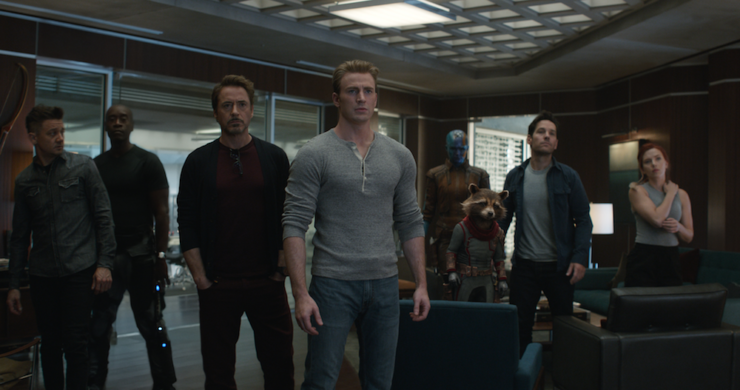The first time the Avengers save the world, all they want is a drink. And to try that schwarma place.
But over the years, as each subsequent appeal to save the world consistently raises the stakes, it prompts the question: If Earth keeps calling on the Avengers, what reward could possibly balance out those increasingly heightened risks? Are superheroes entitled to any recompense beyond the gratitude of the survivors? Grappling as it does with the duty to try versus the temptation of walking away from the fight, Avengers: Endgame also examines what, if anything, superheroes are owed.
What even constitutes a reward for the person who has all the power, all the training, all the courage to be capable of saving the world? It’s redemption, like Natasha’s attempts to wipe clean the red in her ledger. In Clint’s case, it’s a secret family and a safe house off the grid even from S.H.I.E.L.D. It’s time to try and make a relationship work, like Thor and Jane doing the long-distance haul. Sometimes it’s just enough money to live in the world (but not enough to afford Brooklyn, sorry Cap). It’s the ability to establish some sort of barrier between the work one does and the life one leads despite that work.
Avengers: Age of Ultron is where the work/life balance starts to get fuzzy. It’s been three years since the Battle of New York, and the Avengers have become a well-oiled team; even barring any post-apocalyptic scenarios, they’ve clearly trained together in chasing the scepter enough to anticipate each other’s moves and fill in any gaps: Steve and Tony balancing leadership, Bruce and Natasha’s lullaby. That post-battle drink has become a full-fledged victory party at Avengers Tower.
But right when the team is at its peak, of course, is when it has the farthest to fall—as Tony sees, his PTSD from facing the Chitauri egged on by Wanda’s visions. The man who has always unsuccessfully promised his partner that he will ease back from the superhero life is suddenly gripped by the desire, the need, to put the Avengers on autopilot and protect the world without putting himself and his team further into harm’s way. To have it all.
Of course, having it all means a murderbot that takes Tony’s notion of “peace in our time” to its logical if brutal extreme of “exterminate humanity because it’s beyond saving.” But when pushed by the other Avengers for why he took such an extreme risk, Tony’s retort reveals that, despite the team being closer than ever, he’s still operating on an entirely different wavelength:
Anybody remember when I carried a nuke through a wormhole? Saved New York? A hostile alien army came charging through a hole in space. We’re standing 300 feet below it. We’re Avengers. We can bust arms dealers all the live long day, but that up there, that’s the endgame.
Ultron’s mission is to render the Avengers extinct, but it’s not so far from Tony’s own goals; his and Bruce’s research, he justifies to Steve, “would end the team. Isn’t that the mission? Isn’t that the ‘why’ we fight, so we can end the fight, so we get to go home?”
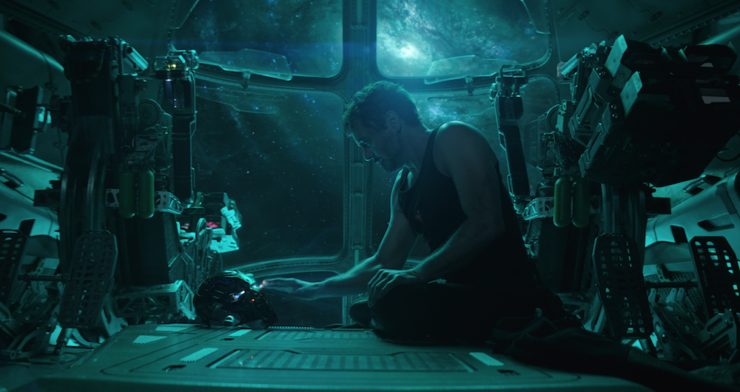
It’s not a question that Steve can answer, because he doesn’t have a home to return to. The closest he gets is the Avengers compound at the end of Ultron, a place that gives him, if not comfort, then purpose in training and strengthening the team. And with Thor returned to Asgard to investigate these Infinity Stones, and Bruce MIA, Steve is legitimately sad to see the team parting ways. But after nearly losing the planet again, this time to an invention of his own making—after seeing how Clint, of all people, has the closest thing to work/life balance, Tony is sorely tempted not by a nebulous alternate life but a concrete vision of stability:
Tony: I’m gonna miss him, though. And you’re gonna miss me. There’s gonna be a lot of manful tears.
Steve: I will miss you, Tony.
Tony: Yeah? Well, it’s time for me to tap out. Maybe I should take a page out of Barton’s book, build Pepper a farm, hope nobody blows it up.
Steve: The simple life.
Tony: You’ll get there one day.
Steve: I don’t know. Family, stability… The guy who wanted all that went in the ice 75 years ago. I think someone else came out.
Tony: You all right?
Steve: I’m home.
And then the closest thing Steve has to home is split by the Sokovia Accords, by those same people in power from The Avengers demanding that these heroes get what they deserve, in all the worst senses of the word. So Steve goes rogue, Tony stays put, the once-great team is disbanded—that could have been the excuse Tony, or any of them, needed in order to finally refuse their duty.
But by the time Thanos finally comes to Earth two years later, when he pulls each of the estranged Avengers into the fray, it’s not even a question: Of course they will stand against the threat, the mad titan pulling the strings of the past six years of their lives.
And then they lose—not even together, like Steve promised in Ultron, but worlds away from one another. In the aftermath is devastation, is loss… but also opportunity. “You want to protect the world,” Ultron taunted Tony, “but you don’t want it to change.” Ironically, it’s the Snap that finally forces the issue, that gives the Avengers the space and time (five years of it) to contemplate the question of what rewards they are owed now that they cannot possibly lose any more.
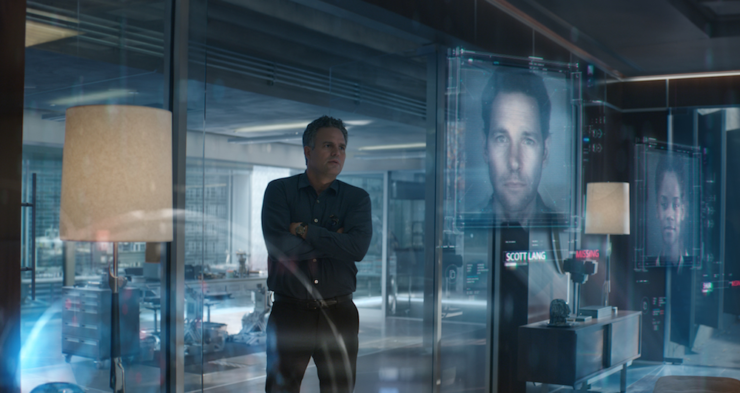
But these rewards weren’t earned. It’s complete randomness, the kind that indiscriminately spared as many as it destroyed. “We got really lucky,” Pepper tells Tony, about their daughter Morgan, their idyllic farm set apart from the rest of the world’s post-Snapture rebuilding. “A lot of people didn’t.” People like Clint, who lost a family while Tony gained one, who copes by executing criminals he believes did not deserve to be spared.
For five years, that ethical imbalance is not enough to compel Tony back into being an Avenger. What does finally move him is the realization that there is a difference between walking away from the fight when there is nothing to be done, and refusing to stand up one more time when he, Tony Stark, is crucial to the outcome:
Tony: I can’t help everybody.
Pepper: It sort of seems like you can.
Tony: Not if I stop. I can put a pin in it right now. And stop.
Pepper: Tony, trying to get you to stop has been one of the few failures of my entire life.
Tony: Something tells me I should put it in a locked box and drop it at the bottom of a lake, and go to bed.
Pepper: But would you be able to rest?
The short answer is no—not when he has the family and the house and the future he supposedly wanted this entire time. It’s only when Tony lays dying in the midst of the battlefield dusted with his enemies, with Pepper whispering, “We’re going to be OK. You can rest now,” that Tony Stark finally gets the reward he really wanted.
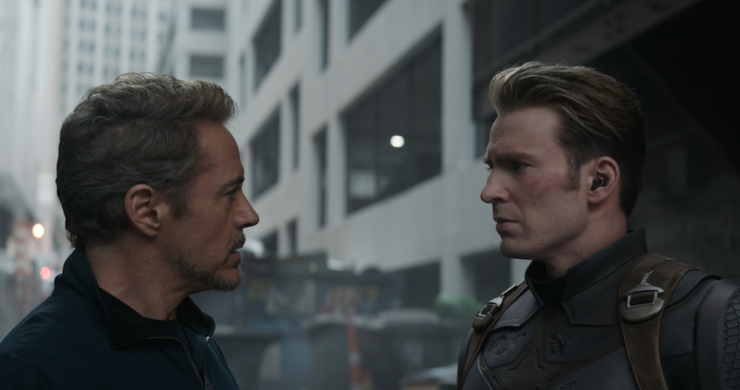
Endgame screenwriters Christopher Markus and Stephen McFeely explained to the New York Times that the film—the entire Marvel Cinematic Universe up until now, really—is about Tony and Steve reaching inverse points on their respective emotional journeys:
And Tony Stark has to die as well?
McFEELY Everyone knew this was going to be the end of Tony Stark.
MARKUS I don’t think there were any mandates. If we had a good reason to not do it, certainly people would have entertained it.
McFEELY The watchword was, end this chapter, and he started the chapter.
MARKUS In a way, he has been the mirror of Steve Rogers the entire time. Steve is moving toward some sort of enlightened self-interest, and Tony’s moving to selflessness. They both get to their endpoints.
Steve’s endpoint, of course, is a beginning of sorts: while returning the Infinity Stones to their respective points in the timeline, he decides to stay in the past (an alternate past, according to the Russo brothers) with Peggy Carter. This could be read as him going back on what he said in Ultron about not being the person who wanted stability; or maybe he felt that he lived enough of this particular life after coming out of the ice that he wanted to go back and try out something different.
Whatever the motive, Steve takes for himself what has historically been so difficult for any Avenger to attain: the happily-ever-after. In fact, the only ’ships to make it through Phase 3 of the MCU were the ones established near the start: Tony/Pepper and Peggy/Steve (and technically Clint/Laura, which was retconned in to predate the MCU). Tony’s is far too brief, but it exists. Clint gets the second chance at happiness. And Steve is some combination of the two, living multiple lives and getting that dance he always wanted.
Thor/Jane succumbed to the typical pressures of an atypical long-distance relationship, due in part to Natalie Portman’s lack of interest in continuing the role but provided with a plausible enough explanation. Wanda/Vision was waylaid by the awkwardness of Wanda having to kill her boyfriend, though we have yet to see how WandaVision resolves this. And Natasha/Bruce just could never get started.
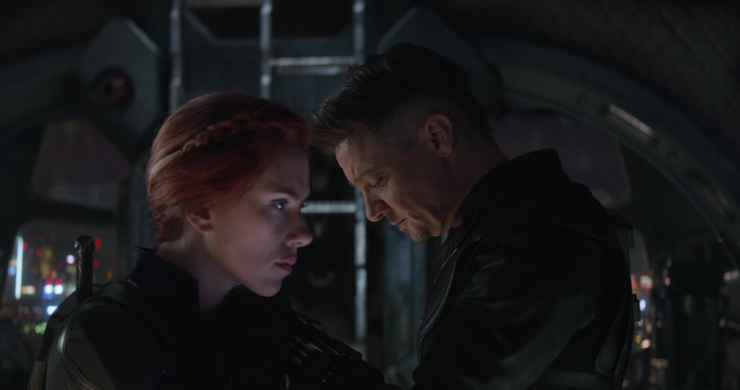
But Natasha could never have the romantic happily-ever-after, because the movies had to set up her selfless arc in Endgame. In the past ten years, any hint of a more-than-teammates relationship with the other Avengers has been systematically stripped of any potential romance: Sure, Tony Stark leers “I want one” after their first meeting, but very quickly he learns that his perky new assistant is actually a S.H.I.E.L.D. agent. She kisses Captain America, but it’s a strategy to distract HYDRA while they’re on the run. Her relationship with Clint had fans ’shipping them early on, only for the reveal of his family to recast her as “Aunt Nat” and reemphasize that they are best friends. And while there was a chance with Bruce, even despite both of them believing themselves to be monsters (her more problematically), she still puts work ahead of that relationship when she forces the Other Guy out. With each potential pairing struck down, Natasha starts Endgame romantically unattached but surrounded by the people she calls her found family.
But that doesn’t mean she’s happy. Because while Clint is out doing his Ronin nonsense, taking out the people he thinks didn’t deserve to live, his best friend would unequivocally count herself in that category. “Even if there’s a small chance… We owe this to everyone who is not in this room, to try,” Natasha, wracked with survivor’s guilt, exhorts the group, most of whom have moved on in some way or another. “For the last five years I’ve been trying to do one thing, get to right here,” she tells Clint on Vormir. “That’s all it’s been about. Bringing everybody back.” McFeely and Markus have a clever, complementary catharsis for Tony and Steve, but Natasha has to carve out her own reward, has to reiterate to the men in her life that this is what she is owed, for all the lives she took before SHIELD and the Avengers, for her own dumb luck in surviving the Snap.
Buy the Book
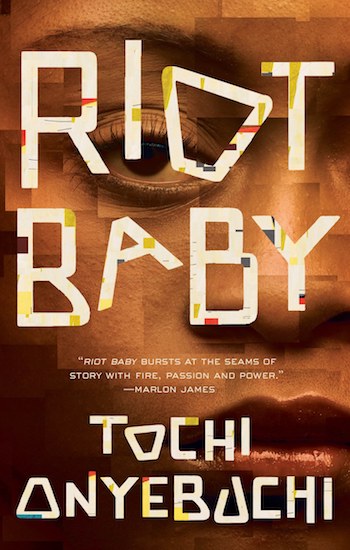

Riot Baby
And that reward? Taking herself out of the fight for good, so long as it turns the tide. “She’s not coming back,” says Bruce, who somewhere in the five-year jump has become Professor Hulk, has reached some weird balance between his two sides. “We have to make it worth it. We have to.”
Like the rest of Endgame’s women, Natasha’s impact on the story lacks the resonance of her male counterparts’ efforts. Like Steve, she had no physical home to go to, but she had an emotional home in her supposed family, some of whom (Tony) don’t even realize that’s what they meant to her. In Ultron, she told Bruce about being sterilized in the Red Room so that she wouldn’t have to worry about a baby: “One less thing to worry about, the one thing that might matter more than a mission… Makes everything easier, even killing.” Except that somewhere in the past decade Natasha found the one thing that could have superseded the mission—her found family—and still gave it up in order to bring half the universe back, in order to balance the cosmic ledgers. Yet she receives no memorial, not even an impromptu Viking funeral (they were already on a dock, come on). To be honest, it’s kind of a lousy trade.
The final montage of The Avengers contrasts footage of politicians and newscasters demanding that these mysterious heroes be held accountable for the destruction wrought upon New York City: “This was their fight,” one legislator says. “Where are they now?” Endgame concludes with the Avengers at Tony Stark’s funeral, mourning privately despite the fact that they are now the most public-facing they have ever been. While the Avengers have previously saved the people of New York and Sokovia, now the entire planet owes them gratitude. But interestingly, there is no montage mirroring The Avengers of the world’s response to being re-Snaptured—no politician publicly calling out the Avengers for fixing their own mess, no average citizen saying “What Tony Stark deserves is a nice long nap.” They might not even know that Tony is dead, depending on how important it is for Pepper and Morgan’s safety to contain that information. Cap’s time-jumping seems to imply that he laid low as a civilian during his alternate life with Peggy. And Natasha’s body is still on Vormir.
The world has little idea just how much the Avengers sacrificed to save them one more time, nor what they were granted in return. But that was never the world’s judgment to pass—not a public decoration of heroes, but a private reckoning among friends. Because the schwarma wasn’t just a treat for a job well done. Like all of these rewards, it was about having a moment where the Avengers weren’t only superheroes, but people, too.
Originally published May 2019.
You can bet that Natalie Zutter has a headcanon that Bruce and Natasha actually “ran with it” somewhere in that five-year jump and it didn’t work out, but at least they got to try; and she will at some point actually write a fanfic to that extent. Talk Avengers: Endgame and superhero rewards with her on Twitter!










